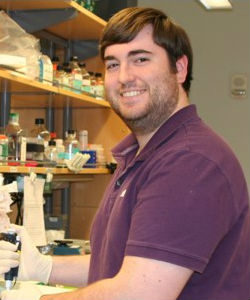
Matthew Kent, Ph.D.
Department: Biological Sciences, 2020
Faculty Mentor: Jim Patton, Ph.D.
Dissertation Title: Factors Regulating Initiation of Retina Regeneration in Zebrafish
Dissertation Abstract: Retina regeneration has been proposed as a potential treatment for retinal diseases. Unlike mammals, zebrafish are capable of naturally regenerating the retina in response to damage. This has led to a concerted effort to understand how this process is regulated. Previously, it was shown that inhibition of gamma aminobutyric acid A (GABAA) receptors in undamaged retinas can induce a regenerative response as measured by proliferation of Müller glia (MG) in zebrafish. The work in this dissertation shows that inhibition of a pharmacologically distinct class of GABA receptors (GABAA-ρ) can also induce proliferation, and that dual inhibition of GABAA and GABAA-ρ receptors leads to enhanced proliferation. Several regeneration-associated genes were shown to be upregulated after GABAA-ρ inhibition supporting a model by which decreased levels of GABA, such as after damage, induce MG dedifferentiation and the generation of progenitor cells capable of replacing lost cell types. Dedifferentiation of MG is thought to require chromatin remodeling, consistent with data in this dissertation showing that miR-216 regulates the histone methyltransferase Dot1l. As miR-216 levels in MG decrease in response to either retina damage or knockdown of miR-216, Dot1l levels increase. If miR-216 is overexpressed, or Dot1l is knocked down, MG dedifferentiation and the generation of progenitor cells decrease. Together, the work in this thesis characterizes two distinct steps during initiation of retina regeneration in zebrafish.
